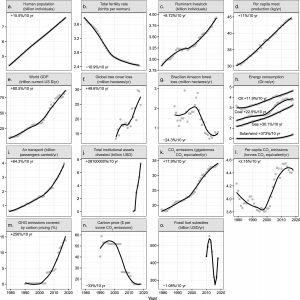
- This event has passed.
The climate-crisis and the future of our planet: a fact-checking session

Prepared by: Tom Hengl (OpenGeoHub) and Ichsani Wheeler (OpenGeoHub)
Venue: Speakers Corner, IMPULSE (how to get to IMPULSE)
Time: 15:30 uur tot 18:30 uur
Target groups: researchers, start-ups, global data providers
Invitations: ESG mailing list, MSc / PhD level students
Rationale
From the extensive fires in Australia to the melting of glaciers and Antarctica’s ice, it appears that global warming is happening even faster than we may have anticipated2. Could it get even worse and can we save the planet by buying an electric car, installing solar panels around our house and/or going vegan? Is Greta Thunberg perhaps too radical or should we become even more radical? There seems to be plenty of evidence for serious concern about the speed of crisis: after all the COPs, with everything having been said and done, we are still emitting more and more CO2 globally.1,5 Could planting 1 trillion trees potentially save us from global warming? How important is the role of agriculture in mitigation of climate change (and has it been exaggerated?).7,11 What are the best strategies for independent actions (human species) and can these be implemented without international agreements? Is the nature of the current world economy (natural resource exploitation-based for-profit liberal capitalism) basically a prolonged self-destruction?8,9
Ripple et al. (2019) recently published an overview of the main known trends of global ecosystem degradation and related climate-crisis. By reviewing the plots in Ripple et al. (2019) one could conclude that any business-as-usual world economy will certainly bring us to the brink of extinction. Although it seems that we potentially have all the technology and knowledge to transition to a “better”, greener economy, it could very well be that it will eventually require that we entirely give up on GDP growth decades (Meadows & Randers 2012). Or is there a smooth transition + adaptation path where we do not have to immediately stop flying, driving, farming animals, using plastic? In the end, we need an economy to prepare for the adaptation.3 Are there faster and more efficient solutions to address global warming and too much CO2 in the atmosphere? And how can we establish an objective system that tracks and reports on the status of the environment without too much controversy?4,6
The presenters will challenge participants to do some fact-checking to see how environmental- / climate-crisis-aware they are. Presentations will take cca 30 minutes after which the floor will be open for questions and discussion.
Discussion points:
-
How accurate is your knowledge of the environmental-/climate-crisis and global warming?
-
Is Australia soon going to all burn up?
-
What are the currently known, best-bet solutions and strategies for mitigating global warming and similar environmental degradation problems?
-
Would planting 1 trillion trees by itself solve the global warming problem?
-
How can we all contribute (locally, regionally, globally) to preventing massive extinction of species in the future (including humans!)?
Programme:
-
15:30–16:00: (I. Wheeler) Fact-checking: how good is your knowledge of environmental-/climate-crisis? (30 min),
-
16:00–16:30: (L. Leal Parente) Deforestation and forest fires in Brazil (30 min)
-
16:30–17:00: (T. Hengl) Earth without people: mapping potential natural vegetation using Machine Learning and global point data sets (30 min)
-
17:00–17:30: Fact-checking results and discussion panel
-
17:30–18:00: OpenGeoHub.org borrel
References:
-
BBC News (2019). Stop abusing land, scientists warn.
-
BBC News (2020). Sir David Attenborough warns of climate ‘crisis moment’.
-
Clark, R (2020). David Attenborough is making the same mistake as Greta Thunberg. The Spectator.
-
Espey, J. (2019). Sustainable development will falter without data. Nature, 571, 299-299.
-
EuroNews (2019). EU still among top 3 world CO2 emitters, new data shows.
-
Kulmala, M. (2018). Build a global Earth observatory. Nature 553, 21-23.
-
Malhotra, A., Todd-Brown, K., Nave, L. E., Batjes, N. H., Holmquist, J. R., Hoyt, A. M., … & Vindušková, O. (2019). The landscape of soil carbon data: emerging questions, synergies and databases. Progress in Physical Geography: Earth and Environment, 43(5), 707-719.
-
Meadows, D., & Randers, J. (2012). The limits to growth: the 30-year update. Routledge.
-
Perry P. (2019). Easter Island Shows Why Humanity Will Be Extinct Within 100 Years. BigThink.com
-
Ripple, W. J., Wolf, C., Newsome, T. M., Barnard, P., & Moomaw, W. R. (2019). World scientists’ warning of a climate emergency. BioScience.
-
Rogers, A. (2019). Trying to Plant a Trillion Trees Won’t Solve Anything. Wired.
